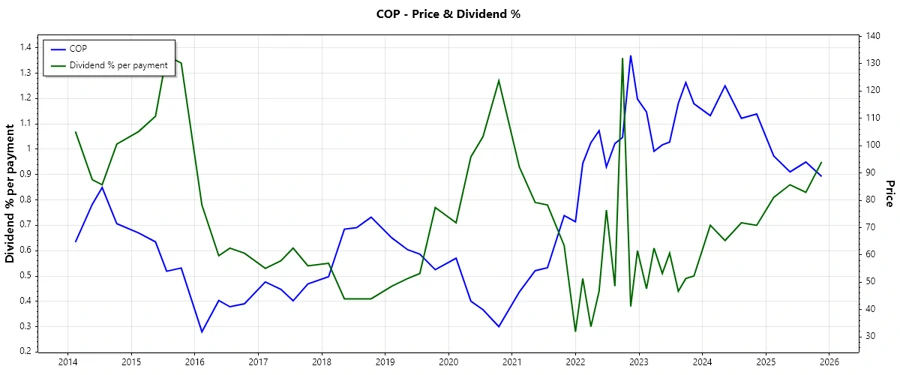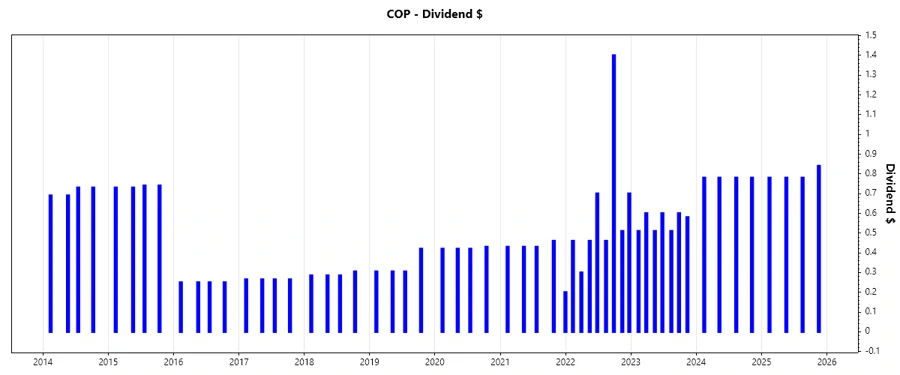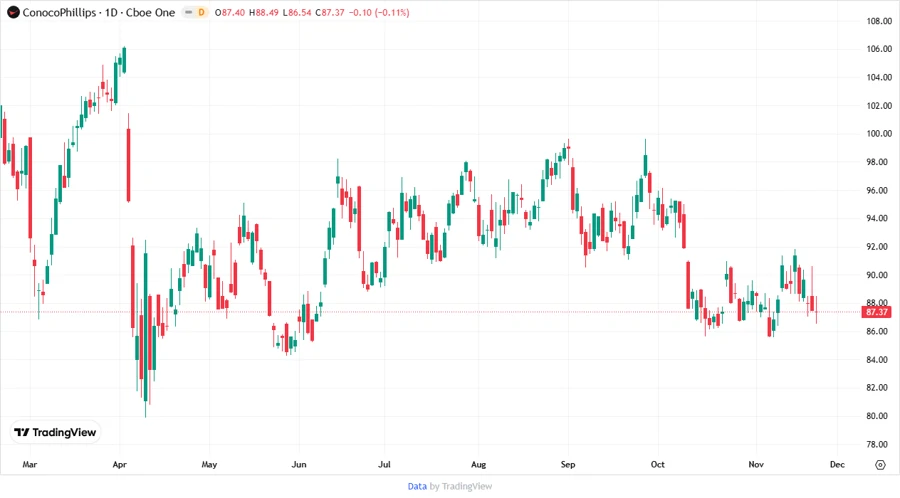November 23, 2025 a 12:46 pm




COP: Dividend Analysis - ConocoPhillips

ConocoPhillips, a leader in the Energy sector, offers an attractive dividend yield. Despite a recent cut in 2024, its ability to sustain and grow dividends over decades showcases its financial robustness. The company's strategic focus on balancing reinvestment and rewarding shareholders positions it well for income-focused investors.
📊 Overview
ConocoPhillips operates within the Energy sector, providing a solid dividend yield and a longstanding history of constant payouts. Despite a recent dividend cut in 2024, the company's enduring track record and average yield reflect its commitment to shareholders.
| Sector | Dividend Yield | Current Dividend Per Share | Dividend History | Last Cut or Suspension |
|---|---|---|---|---|
| Energy | 3.58% | $3.09 | 44 years | 2024 |
📈 Dividend History
The historical consistency in dividend payments indicates a stable financial framework. Maintaining a long streak of distributions strengthens investor trust and reflects positively on the company’s cash flow management.

Below is the recent dividend payment summary, showcasing the trend over the last five years.
| Year | Dividend Per Share (USD) |
|---|---|
| 2025 | 3.18 |
| 2024 | 3.12 |
| 2023 | 3.91 |
| 2022 | 4.99 |
| 2021 | 1.95 |
🗣️ Dividend Growth
A company's dividend growth serves as an indicator of its capacity for long-term wealth generation for investors. Reviewing growth rates helps evaluate potential future payout increases.
| Time | Growth |
|---|---|
| 3 years | 16.96% |
| 5 years | 18.50% |
The average dividend growth is 18.50% over 5 years. This shows moderate but steady dividend growth.

🧮 Payout Ratio
Payout ratios provide insights into a company's liquidity and its ability to sustain dividend payments. Tracking these can signal potential payout sustainability.
| Key Figure | Ratio |
|---|---|
| EPS-based | 43.61% |
| Free Cash Flow-based | 23.19% |
The EPS payout ratio of 43.61% and FCF ratio of 23.19% indicate a prudent dividend policy that balances growth and distribution.
💸 Cashflow & Capital Efficiency
Evaluating cash flows helps in assessing a company's ability to fund dividends and business operations effectively. Capital efficiency metrics furthermore provide insights into the company's investment effectiveness.
| Year | 2024 | 2023 | 2022 |
|---|---|---|---|
| Free Cash Flow Yield | 6.85% | 6.24% | 12.08% |
| Earnings Yield | 7.88% | 7.82% | 12.39% |
| CAPEX to Operating Cash Flow | 60.22% | 56.34% | 35.88% |
| Stock-based Compensation to Revenue | 0% | 0% | 0.48% |
| Free Cash Flow / Operating Cash Flow Ratio | 39.78% | 43.66% | 64.12% |
The data shows strong cash flow generation ability which supports sustained dividend payouts and potential business reinvestment.
🏋️♂️ Balance Sheet & Leverage Analysis
A robust balance sheet ensures sustainability through economic cycles. Leverage ratios highlight debt levels and financial risk exposure.
| Year | 2024 | 2023 | 2022 |
|---|---|---|---|
| Debt-to-Equity | 39.12% | 39.84% | 35.81% |
| Debt-to-Assets | 20.65% | 20.47% | 18.32% |
| Debt-to-Capital | 28.12% | 28.49% | 26.37% |
| Net Debt to EBITDA | 0.81 | 0.54 | 0.29 |
| Current Ratio | 1.29 | 1.43 | 1.46 |
| Quick Ratio | 1.14 | 1.29 | 1.36 |
| Financial Leverage | 1.89 | 1.95 | 1.96 |
These ratios suggest that ConocoPhillips maintains a balanced approach towards leveraging, maintaining adequate liquidity.
🦾 Fundamental Strength & Profitability
Profitability ratios signify operational efficiency and effectiveness. Consistent ROE and profit margins provide insights into long-term financial health.
| Year | 2024 | 2023 | 2022 |
|---|---|---|---|
| Return on Equity | 14.23% | 22.16% | 38.79% |
| Return on Assets | 7.51% | 11.39% | 19.84% |
| Net Margin | 16.88% | 19.45% | 23.69% |
| EBIT Margin | 27.06% | 30.91% | 37.26% |
| EBITDA Margin | 44.72% | 45.93% | 47.25% |
| Gross Margin | 29.35% | 32.42% | 37.70% |
| R&D to Revenue | 0.15% | 0% | 0.09% |
The high profitability metrics are indicative of effective cost management and a competitive edge in the market.
📉 Price Development

✅ Dividend Scoring System
| Category | Rating (1-5) | Score |
|---|---|---|
| Dividend Yield | 4 | |
| Dividend Stability | 4 | |
| Dividend Growth | 3 | |
| Payout Ratio | 4 | |
| Financial Stability | 4 | |
| Dividend Continuity | 4 | |
| Cashflow Coverage | 4 | |
| Balance Sheet Quality | 4 |
Overall Score: 31/40
🌟 Rating
In conclusion, ConocoPhillips demonstrates solid financial health with a robust dividend strategy. Despite a recent dividend cut, the company’s historical performance and current metrics suggest reliability for income-seeking investors. Current market indicators recommend a balanced approach, weighing potential growth against historical stability.
